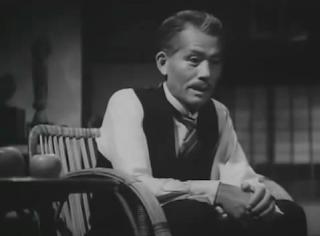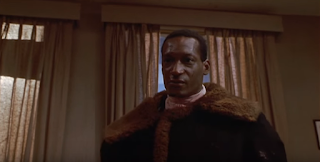Little Malcolm follows an English layabout who attempts to create some strange virility based political party after being thrown out by college.
John Hurt's appearance here is very similair, though perhaps this is just uniform for an English near-do-well, to David Thewlis as Johnny in Mike Leigh's Naked. The comparison doesn't stop there though as they both handle their cigarettes by holding them just barely at the bottom of their mouth, saunter along with a poorly postured gate, most of the time anyways, and aren't just any sort of layabout they're the, unfortunately perhaps, philosophical sort. Now my, brief research into a recognized connection between the two brought up nothing, but I still felt I had to point it out it. Naked is the superior film though as this film feels very much stuck within its stage roots leaving itself to be really carried by the actors, luckily for the film two of those actors are John Hurt and David Warner. John Hurt is such a great actor that to see him just take on an "actor's role" is probably going to be a bit of treat. Hurt again begins in effectively creating that unique personal style of the character, that I have to believe influenced at least one film to come. Hurt's terrific at being this man who we seem to meet at a particular low point in his life, as that does seem emphasized in his very physical being. The way Malcolm deals with this problem though is rather strange, and seems like something that it's a bit difficult to make logical within the more literal medium of film.
Hurt's performance is remarkable as he does make logical sense of the character even with the odd way in which his character behaves. He does this by first establishing that starting point of the character. In the moments where Hurt is alone he portrays him basically as this loser. He just there with little to no passion within the man as he sits around his apartment doing nothing but wasting his hours away. Hurt takes this further actually by creating a real sadness in Malcolm's lack of accomplishments, which seem centered around his inability to take a further step with the young woman Ann who seems interested in him yet he fails to properly compensate. Hurt stays nuanced in these moments as he just reveals the quiet, yet palatable internalized sadness in these reactions to her. When he verbalizes essentially his impudence Hurt importantly does not place any theatricality on these thoughts. In these moments Hurt breaks down Malcolm to his purest form which is just as a sad little man pained by his weaknesses. Hurt in these moments effectively anchors the movie since he shows, that despite anything else that we will see, Malcolm is this troubled college drop out beneath anything else we may see.
Hurt builds upon his setup and we see this when we witness Malcolm interact with the other characters. In his scenes alone with the subtly named, I write with much sarcasm, Charles Nipple (David Warner) Hurt presents just a layer of a facade for Malcolm. Hurt only fashions a partial one that he portrays mostly as this surface reaction to Charles a man who seems so comfortable with himself. Hurt presents a direct anger and antagonism. Hurt carefully directs this in the scenes though as a passion, simplistic, hatred not so much really towards the man, but rather that confidence he exudes in being himself. Hurt astutely does not make these moments pure in the facade though as Hurt shows much more of the real Malcolm still in these moments. As the anger he inflicts towards Charles has still a great deal of that sadness that defines the man, and there still is a great degree of discomfort in himself even as he lashes out at Charles for being so at ease with his very being. Hurt though has another layer to facet though, sort of the crux of the story though, since it's the version of Malcolm that I suppose sells the plot as well as uses up a great deal of the film's screentime.
The last relationship is between Malcolm and two of his other friends, more of lackeys, Wick and Irwin. It is there where he fashions the political party based on proper erections, and dominant men. Hurt in these scenes creates the full facade of them which actually makes sense of the whole ridiculousness of the concept, since within the film Hurt portrays Malcolm essentially playing the part. The part Malcolm is playing is of this maniacal cult or rebel leader with the other men. Hurt does not depict this a mere fantasy for the sake of it but rather shows it as an active display of Malcolm attempting to delude himself into any type of confidence. In these moments Hurt makes Malcolm a different man but only in terms of putting on this fake act. Now all credit must go to Hurt for making these scenes make any sense, however they also are technically just a chance for some serious ACTING on John Hurt's part. Thankfully if John Hurt's doing the ACTING up all for it, especially he does bother to ground these through his other scenes. Now these scenes are a bit much with just how thick the dialogue and monologues are in these scenes of Malcolm creating phony trials, kidnappings and other duplicitous acts in the name of the part.
Hurt is great in these scenes and has earned the right to throw himself right into them. The film further benefits from them since you get to have John Hurt playing different types of roles as part of this one which is quite the splendid thing. We actually get some shades of both his later dictator in V For Vendetta, as well as how his own O'Brien in 1984 might have been if he ever got a chance to reverse the roles. Hurt brings that grandeur of the firebrand leader, and the viciousness of a true violent anarchist as he vindictively pursues his "righteous" cause. Hurt goes all the way in bringing the fullest intensity, and I'll admit it is rather fun to watch just all on its own because of Hurt. This is even as the scenes as written do become a bit tiresome. Hurt's a great actor, so naturally he's great at acting while acting within this film. He's wonderfully insane brute as he leads his men as a downright insane impotent army. Hurt carefully never loses his fundamental definition of the role as even in these scenes he has these careful moments where he breaks, where he delivers the man filled with a brief anxiety that he can only overwhelm by reinforcing his sentiments in all the more zealous fashion. Eventually though Malcolm is called directly on his delusions by Ann which is an outstanding scene for Hurt. In the scene Hurt reverts to the sad quiet man filled with desperation. When she outright asks for him to have sex with her, Hurt's amazing as in his face he represents sheer terror of a man who has no idea how to connect with a woman in any real way. It is only when his henchmen reappear that Hurt reveals slowly growing confidence again but only in the most despicable way. Hurt reveals the man just revert to his delusions, but this time it is even messier as his speaks with such certainty yet his eyes are still are clasped into a deep depression. This time the fantasy holds not a bit of enjoyment for anyone, as Hurt makes the worlds collide in a most, purposefully, unappealing way. Although I would not classify this film as a major success, or perhaps even a success, this is great performance by John Hurt. He takes a potentially unwieldy role and successfully translates the threads into a cohesive and compelling whole.









































